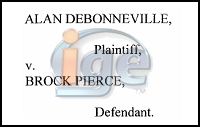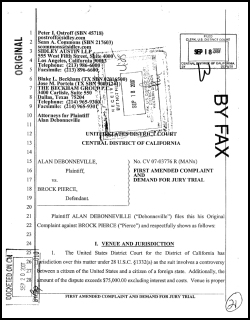Amended Complaint Against IGE Founder Brock Pierce Alleges Underhanded Dealing, Exploited Gold, Phony Blackmail Claims, and Unpaid Spanish Taxes
March 4th, 2008 by Benjamin Duranske
 Virtually Blind has obtained the Amended Complaint (.pdf) filed in the Central District of California on behalf of Alan Debonneville against Internet Gaming Entertainment (IGE) founder Brock Pierce. Debonneville is identified as a co-founder of US IGE.
Virtually Blind has obtained the Amended Complaint (.pdf) filed in the Central District of California on behalf of Alan Debonneville against Internet Gaming Entertainment (IGE) founder Brock Pierce. Debonneville is identified as a co-founder of US IGE.
The Amended Complaint (which I must caution readers is an advocacy document, and thus only reflects one side of the story) chiefly alleges that through a number of false statements, Pierce deprived Debonneville of millions of dollars Debonneville was owed under his agreements with IGE. Debonneville names an even dozen claims ranging from breach of fiduciary duty to fraud. Along the way he accuses Pierce of failing to pay taxes owed to the Spanish government, using corporate funds for personal expenses, falsely telling Debonneville that one of the other executives in IGE was blackmailing Pierce, and partnering with a third party, Jonathan Yantis, to exploit bugs in game software to make unauthorized duplicates of in-game items and currency to offer for sale via IGE.
IGE’s business model is based on real money trading (“RMT”) — buying and selling virtual currency and items in MMO games for real money. The vast majority of these sales are prohibited by the Terms of Service of the games in question. In spite of that, the virtual goods industry is significant and potentially highly lucrative. According to the Amended Complaint, IGE was at one point valued by Goldman-Sachs at $220m — nearly a quarter of a billion dollars.
Aside from the more colorful claims, the Amended Complaint represents a fairly typical fight between founders of a successful company over profits. An earlier version of the complaint (which was publicly available for several months before Pierce’s lawyers had it sealed) raised a number of much more scandalous allegations. That version of the complaint was the subject of an earlier article at VB. I’ll leave analysis of the business allegations in the Amended Complaint (which are extensive) for sites more focused on that end of things. From a virtual law perspective, there are two things worth noting.
 First, this is yet another lawsuit that simply assumes the existence and value of “virtual goods” (as, of course, it must, since IGE is in the business of selling them). As such, if this goes to summary judgment, a resulting order could well end up referencing the apparent value of virtual goods even though the Terms of Service (TOS) and End User License Agreements (EULAs) for the games involved generally deny that they have any value.
First, this is yet another lawsuit that simply assumes the existence and value of “virtual goods” (as, of course, it must, since IGE is in the business of selling them). As such, if this goes to summary judgment, a resulting order could well end up referencing the apparent value of virtual goods even though the Terms of Service (TOS) and End User License Agreements (EULAs) for the games involved generally deny that they have any value.
The nature of virtual goods is unlikely to come up directly here because it is unlikely anyone will raise a defense based on the TOS (doing so would call attention to the fact that IGE’s business depends entirely on customers and suppliers violating contracts with game providers). That means that the value of virtual weapons, gold, furniture, houses, and everything else may simply be taken as as given by the judge. That could provide some interesting citation possibilities for future briefing in cases involving virtual goods. I’m not holding my breath though; cases like this frequently settle before summary judgment, particularly when valuation is straightforward and (as appears true here) both parties want to avoid publicity.
The other interesting aspect of the Amended Complaint from the standpoint of the “big picture” questions in virtual law is that it focuses attention on the methods by which IGE procures gold and virtual items for sale. Specifically, the Amended Complaint alleges that a virtual property dealer named Jonathan Yantis (who now, according to the complaint, controls the RMT arm of IGE) “stated that through the hiring of certain individuals who he had a long time business relationship with, Yantis would sell currency that had been exploited or duped.” The Amended Complaint continues:
Exploiting or duping is a process whereby an outsider hacks the game program into creating currency for the individual or duplicating an item and then selling it over and over which also results the creation of currency. These actions allow for the exploiter/duper to create an endless supply of currency without any real cost to that currency. This is something that Yantis had done in the past and had made large profits from. The exploiter/duper would typically receive a commission for any currency sold of about 40% of the sales price. Due to the currency being exploited, Yantis was and would be able to sell currency at a price significantly below market, since the cost of the currency sold was non existent. This also allowed for an infinite supply to be created in what could take as little time as a few minutes.
Yantis indicated that this was also how he could tum the trading arm of IGE around and make it profitable, almost instantly. Pierce was aware of Yantis’ intent to use these exploits. In fact, Pierce counted on them as part of the rationale behind why Yantis should be brought back to work for IGE.
This raises some interesting questions. As much as most players and providers say they hate gold farming and sales that are derived from in-game mechanics, the phenomenon pales in comparison to the damage that can be instantly done to a virtual economy via item and gold duplication bugs. But from a contract law perspective (and thus a business perspective) the question is, somewhat disturbingly, essentially the same — violating the Terms of Service by selling farmed gold isn’t much different than violating them by duplicating gold and then selling it. Should civil law differentiate? What about criminal law? What about goods in games where the provider or a sanctioned third party offers and profit from sales (such as the Station Exchange/Live Gamer service for some EverQuest II servers) on which IGE operates? This case isn’t likely to provide much direct discussion on this point, but it does highlight some troubling questions.
Virtually Blind is acquiring the rest of the documents in this case, including Pierce’s Answer and Counterclaims, and will post them over the next week or so. There is a mandatory settlement conference scheduled for March 10. If the case fails to settle, a jury trial is scheduled for May 20 in Los Angeles, presided over by the Honorable Manuel Real.
Related Posts on Virtually Blind
- Settlement Imminent in Suit Alleging Underhanded Dealing at Virtual Property Dealer IGE: "According to minutes (.pdf) obtained from the court, a recent..." (5 comments)
- IGE Founder Brock Pierce Claims Texas Attorney Was Overpaid for Virtual Goods in Exchange for Personal Benefits to IGE Co-Founder: "Virtually Blind has obtained Brock Pierce's Answer and Counterclaims ..." (0 comments)
- Lawsuit Against IGE Founder Brock Pierce Alleges Underhanded Dealing at Virtual Property Company: "Editor's Note: At the request of Brock Pierce's attorneys, this..." (28 comments)
One Response to “Amended Complaint Against IGE Founder Brock Pierce Alleges Underhanded Dealing, Exploited Gold, Phony Blackmail Claims, and Unpaid Spanish Taxes”
Leave a Reply
Notes on Comments: Your first comment must be manually approved, but after it is you'll be able to post freely with the same name and email. You can use some HTML (<a> <b> <i> <blockquote> etc.) but know that VB's spam blocker holds posts with five or more <a> links. VB supports gravatars. Got a gravatar? Use the associated email and it'll show with your comment. Need one? Set it up for free here.



Sorry – I had a typo in the links to the Amended Complaint. They’re active now.